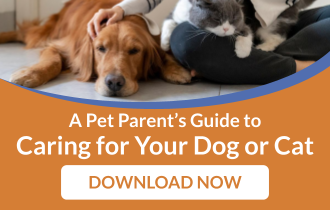Anyone living with a dog knows that stare of intensity that means they want to try what’s on your plate...while a bowl full of kibbles sits uneaten.
And cats…. well, they’re just in charge of us, right?
When it comes to “people food,” my advice to all pet parents is this. Just don’t give your pet people food or table scraps. But, I know that it happens – intentionally or by accident. Because of this, you need to know which foods are toxic for dogs and cats. It can mean the difference between health and serious illness leading to an unplanned (and expensive) visit to an emergency vet clinic.
13 Foods to Avoid
The American Veterinary Medical Association provides a list of 7 foods you absolutely shouldn’t feed your dog or cat. Those foods are:
- Anything with Xylitol, an artificial sweetener – this can be found in gum, candy, and even peanut butter!
- Chocolate (the darker it is, the more toxic it is for pets)
- Onions
- Grapes and raisins
- Fatty and fried foods
- Macadamia nuts
- Avocados
The American Society for the Prevention of Cruelty to Animals (ASPCA) runs a Poison Control Center. They list some additional items for pets to avoid:
- Caffeine
- Alcohol
- Yeast dough (a tiny bit of bread is OK, but should be less than 5-10% of their daily intake)
- Raw/undercooked meat, eggs, and bones*
- Milk (dogs and cats do not produce enough lactase, the enzyme that breaks down lactose in milk)
- Large amounts of salt
The American Animal Hospital Association keeps track of poison reports dialed into the Pet Poison Helpline (800-213-6680). In 2011, most of the reports of accidental pet poisoning involved the foods listed above, especially chocolate, xylitol, raisins, and grapes.
When it comes to fatty and fried foods, a nibble won’t send your pet to the hospital, but these animals didn’t evolve to digest vegetable oil, and high-fat foods can cause pancreatitis, which is extremely painful and causes vomiting.
Bones and Chews
While bones and chews aren’t exactly food, sometimes dogs think they are. *Not all experts agree about whether dogs should get bones. Some believe that raw bones from cows and bison are great for dogs’ dental  health because they remove plaque. They also are believed to be safer than cooked bones. If you do feed your dog raw bones, they should never get pork bones or any kind of rib bones. They can splinter and crack. Also, it’s common for dogs to get a bone stuck on their lower jaw and other places in their mouth.
health because they remove plaque. They also are believed to be safer than cooked bones. If you do feed your dog raw bones, they should never get pork bones or any kind of rib bones. They can splinter and crack. Also, it’s common for dogs to get a bone stuck on their lower jaw and other places in their mouth.
There are so many different chew products on the market, it can be tough to choose. In general, if they are going to get a chew product, ask your vet what they recommend. Bully sticks and other “natural” products like pig’s ears can contain bacteria that can make your dog sick. If you still want to give your dog these kinds of treats, wash your hands after handling them because those bacteria can also make you sick. You can also get indestructible chews, such as Nylabones and various kongs. Some can be loaded with peanut butter (without Xylitol!) to keep a pup busy.
In general, any bone or chew toy that your dog could swallow whole is a danger to their health. If they swallow a bone or chew, it can always get stuck somewhere on the way down to the stomach and out of their body. This can definitely lead to an unwanted and possibly expensive trip to the vet. That's why it's best to find something larger than their head to offer because it'll be difficult for them to swallow that whole. If you're not sure that a bone or chew is safe, especially if it's been around and gnawed on for a long time, then my advice is to throw it out.
What About Treats and Table Scraps?
Well, that question is the subject of an age-old debate.
Like me, WebMD recommends against feeding any human foods to pets, pointing to the toxins listed earlier, plus noting that fatty foods can cause pancreatitis and that some "people food" leads to problems like vomiting or diarrhea.
On the other hand, we wouldn’t have dogs if wolves hadn’t been domesticated by hanging around fires and getting meat scraps.
These days, reputable pet food companies invest a lot of resources into creating nutritious and balanced foods designed specifically for pets.
If you’re eating healthy whole foods and want to share some with your pet (after you eat, not from the table), use your common sense.
And, as always, tell your veterinarian all the foods that your pet eats (including treats and anything your pet finds on their own) and ask if it’s healthy for your pet. They can help you find the best food to keep your pet healthy and prevent vomiting and diarrhea that can lead to an unwanted visit back to their office before the next routine visit.
